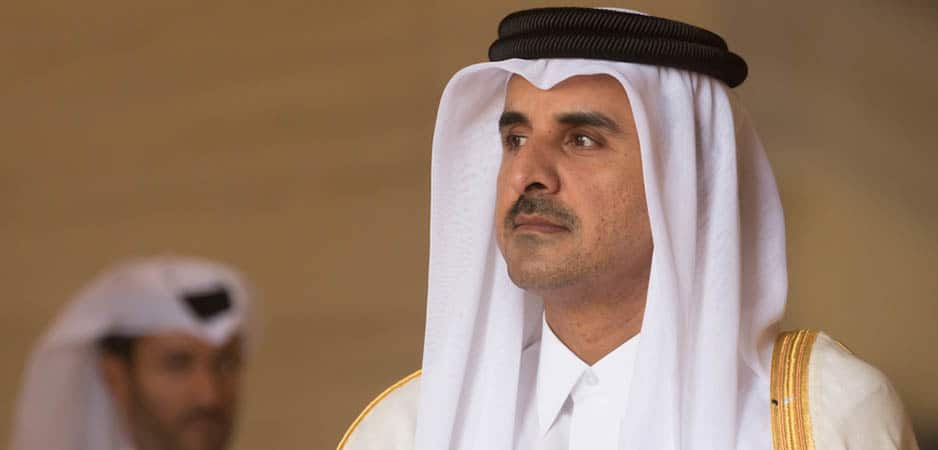In the face of an embargo, Qatar has challenged Saudi Arabia and the UAE.
In June 2017, a group of countries led by Saudi Arabia and the United Arab Emirates formed a diplomatic and economic blockade against the state of Qatar. Yet rather than bringing Qatar to its knees, the crisis has benefited the tiny Gulf nation in numerous ways. The siege has forced Doha to diversify its relations regionally and globally to gain independence from Riyadh and Abu Dhabi’s spheres of influence.
Qatar, a gas-rich Arab emirate, has reassured the world that regardless of the embargo, its economy has not been affected and it is ripe for investment. In fact, Qatari citizens have not particularly felt the impact of the blockade. Rather, it is foreign workers — making up 88% of the country’s population — who have been hit the most for a number of reasons.
First, at the outset of the crisis in 2017, Qatari employers living in Arab countries enforcing the embargo were deported and forced to put business operations on hold. This meant South Asian construction workers were stranded in the Gulf. Second, foreign workers — especially from South Asia — primarily comprise the blue-collar working class in Qatar, so they were disproportionately harmed when the blockade caused material shortages and closed construction sites. Third, because migrant workers are often paid low salaries, even the slightest increase in food prices can immensely impair their standard of living.
Meanwhile, the state itself has triumphed over the blockade’s economic impact. By November 2018, Qatar was no longer spending any of its financial reserves to offset the embargo’s deleterious effects and, as a result, its economic prospects seem promising.
The Economy and Al-Udeid
Ironically, Qatar owes its current success to the Saudi-led coalition’s economic and diplomatic severance. Had it not been for the blockade, Qatar would not have been so incentivized to fortify its global reputation. While lobbying and grants won over many policy officials and academics, Qatar most efficaciously solidified a positive relationship with the US by intensifying America’s military dependence on the country.
In Qatar’s al-Udeid airbase, the US has a forward listening post on Iran, US Central Command operating headquarters and a Gulf-based launching pad to wage its military campaigns in Afghanistan, Iraq and Syria. The Qataris used the airbase to counter US President Donald Trump’s pro-Saudi foreign policy. Doha offered to expand al-Udeid’s resources and upgrade Hamad Port for use by the US Navy, all in exchange for a closer relationship with Washington.
Additionally, it was the very embargo intended to incapacitate Qatar’s economy that led to its prosperity and diversification. To compensate for severed economic ties with other Gulf states — including Saudi Arabia, the UAE and Bahrain — Doha sought innovative ways to attract international business and foreign direct investment (FDI). Now, companies are enticed to operate in Qatar because it has “a legal environment based on English common law, the right to trade in any currency, 100 percent foreign ownership, 100 percent repatriation of profits and a 10 percent corporate tax on locally sourced profits.”
Even pre-existing firms that wanted to maintain their Qatari clientele contributed to Doha’s financial success. These companies had to relocate their businesses to the country, thereby increasing FDI and local jobs in Qatar. Despite the embargo, FDI to Qatar increased by 4% in 2017, and the number of new companies licensed to operate in in the country went up by 66% in the same year.
The Saudi-led blockade has also contributed to Qatar’s self-sufficiency. Along with foreign direct investment, the domestic production of medicine and agricultural products has grown significantly.
For example, Qatar decided to bolster national food security through Baladna, a company that has become the country’s largest locally-owned fresh dairy and beverage supplier. Driven by the impossibility of importing foods from nearby countries, the Qatari government implemented Baladna and other infrastructure projects to cope with the desert landscape. These initiatives use innovative solutions to transform the arid landscape into fruitful agricultural land, which is much more than what other Gulf states can boast about.
Due to its newfound economic vigor and weighty relationships in the global community, Doha is rising to regional prominence, even threatening Saudi and Emirati hegemony in the Gulf. Equipped with financial stability and independence from its neighbors’ agendas, Doha provided $500 million to Lebanon, $150 million to civil servants in Gaza and additional aid to Pakistan at the beginning of 2019. Unlike other Gulf states, Qatar does not have to abide by the economic rules of the Saudi and Emirati-led Gulf Cooperation Council (GCC). Instead, it can undermine this hierarchy by distributing regional aid to places like Lebanon, where Saudi Arabia has been working to counter Hezbollah, an Iran-backed political, military and social organization.
Jamal Khashoggi and Human Rights
Qatar’s uprooting of the status quo is well-timed, thereby increasing the odds of its successful ascension to regional prominence. Surviving its own defamation at the hands of the Saudi-led coalition, Qatar can now bask in the condemnation of Saudi Crown Prince Mohammed bin Salman, who has been criticized for the war in Yemen, the incarceration of women’s rights activists and the killing of Saudi journalist Jamal Khashoggi.
Similarly, the UAE clings onto its credibility after convicting a British graduate student, Matthew Hedges, for spying despite the lack of clear evidence. So long as these besmirched Saudi and Emirati reputations persist, Qatar will have the opportunity — not just the financial means — to secure its status as a key regional player.
Of course, no country has a perfect human rights record and Qatar is no exception. In March 2016, a report by Amnesty International found that migrant workers building the Khalifa International Stadium in Doha for the 2022 FIFA World Cup had “suffered systematic abuses, in some cases forced labour.” While the country officially amended its kafala sponsorship system for foreign workers later that year, it has still faced criticism from human rights organizations.
Mediating between the US and Iran
Even more surprisingly, the coalition inadvertently pushed Qatar and Iran closer. Fearful of Doha’s openness to Iran, the Saudi-led coalition enforced a trade and travel embargo on the Qataris back in 2017. This led to a loss of imports and the closure of airspace in countries like the UAE and Saudi Arabia to all Qatari-registered aircraft. However, the blockade cemented relations between Iran and Qatar as the Iranians made up for lost trade and helped Doha devise new flight routes.
Although, amid current tensions between the US and Iran over the failure of the nuclear deal that was agreed in 2015, the embargo has also brought Qatar closer to Washington. Due to lobbying efforts, financial grants and the developments at al-Udeid airbase, the relationship between Qatar and the US has never been better. Uniquely situated in the good graces of both Iran and the US, Qatar could serve as an indispensable mediator between the two. Just recently, Qatari Foreign Minister Sheikh Mohammed bin Abdulrahman al-Thani placated Iranian concerns about new US military deployments to the Middle East. As reported by Mark Perry in The American Conservative: “It’s likely, as this writer has been told by senior Pentagon officers, that al-Thani brought just the opposite message: that the new deployments are not a preparation for war, but an attempt to prevent it.”
 At the end of May, Saudi King Salman bin Abdul Aziz hosted a triple summit in Mecca for Arab and Muslim leaders. Despite the ongoing embargo, he invited Qatari Emir Sheikh Tamim bin Hamad al-Thani to attend, which was aimed at establishing a diplomatic consensus on regional issues, including Iran. Although the emir did not travel to Mecca, opting to send the Qatari prime minister instead, his unexpected invitation lends credence to the idea that Qatar is an invaluable asset in diffusing tensions between Iran and its adversaries.
At the end of May, Saudi King Salman bin Abdul Aziz hosted a triple summit in Mecca for Arab and Muslim leaders. Despite the ongoing embargo, he invited Qatari Emir Sheikh Tamim bin Hamad al-Thani to attend, which was aimed at establishing a diplomatic consensus on regional issues, including Iran. Although the emir did not travel to Mecca, opting to send the Qatari prime minister instead, his unexpected invitation lends credence to the idea that Qatar is an invaluable asset in diffusing tensions between Iran and its adversaries.
Despite lacking the coercive force of a large state, Qatar boasts a trifecta of close relations with Washington and Tehran, influence in US circles and recent negotiating success. In February and March, Doha hosted the longest round of peace talks between the US and the Taliban to date. Although no agreements were finalized, Qatar facilitated unprecedented strides toward peace in Afghanistan, giving Doha the image of a potential peacemaker between the US and Iran.
Two years after the Gulf crisis began, Abu Dhabi and Riyadh have nothing to show for their coalition’s efforts to pressure Qatar into surrendering. Rather than folding to its GCC neighbors, Doha has challenged the Saudis and Emiratis. Qatari economic successes, coupled with Saudi and Emirati reputational shortcomings, provide further opportunity for Doha to continue rising to regional prominence.
*[Gulf State Analytics is a partner institution of Fair Observer. A previous version of this article incorrectly stated that Baladna raises livestock. Updated: June 12, 2019.]
The views expressed in this article are the author’s own and do not necessarily reflect Fair Observer’s editorial policy.
Support Fair Observer
We rely on your support for our independence, diversity and quality.
For more than 10 years, Fair Observer has been free, fair and independent. No billionaire owns us, no advertisers control us. We are a reader-supported nonprofit. Unlike many other publications, we keep our content free for readers regardless of where they live or whether they can afford to pay. We have no paywalls and no ads.
In the post-truth era of fake news, echo chambers and filter bubbles, we publish a plurality of perspectives from around the world. Anyone can publish with us, but everyone goes through a rigorous editorial process. So, you get fact-checked, well-reasoned content instead of noise.
We publish 2,500+ voices from 90+ countries. We also conduct education and training programs
on subjects ranging from digital media and journalism to writing and critical thinking. This
doesn’t come cheap. Servers, editors, trainers and web developers cost
money.
Please consider supporting us on a regular basis as a recurring donor or a
sustaining member.
Will you support FO’s journalism?
We rely on your support for our independence, diversity and quality.






